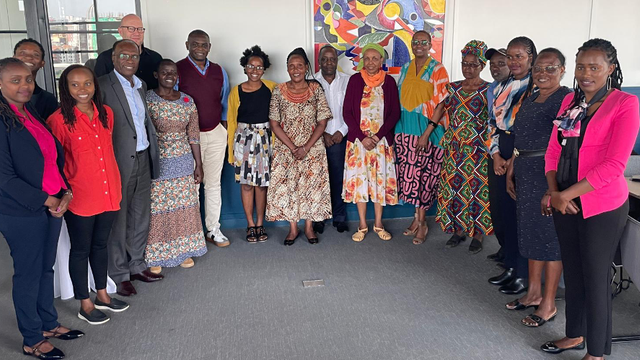Carbon Credits for Conservation Farming: FELD Catalyst Hosts Dialogue with Pioneering Kenyan Farmers
Carbon markets have been, and continue to be, a hotly debated issue, including in Africa since the first Africa Climate Summit in Nairobi in September 2023. For some, they hold tremendous opportunities and potential for mobilizing desperately needed funding to drive development and societal transformation; for others they represent a road to nowhere, a pseudo-solution that benefits wealthy polluters in the global North rather than local or global climate/development agendas.
In June 2024, on the eve of the latest annual African Development Bank meeting in Nairobi, the FELD Catalyst team saw an opportunity to engage our local partners around their existing experience with carbon markets, and to link this knowledge with the broader debate on climate and development financing, including for the adaptation of agriculture systems and community development in Kenya, and beyond.
Alongside partners at TIST (The International Small Group and Tree Planting Program), and WRI Africa, FELD convened an informal roundtable dialogue discussion in Nairobi. More than 130 thousand Kenyan TIST farmers from nearby rural counties of Meru, Kirinyaga and Machakos were brought together for an afternoon of lively discussions with curious experts and researchers from the Greenbelt Movement, CIFOR-ICRAF, SDSN Kenya, FOLU Kenya and the Kenya National Farmers Federation (KENAFF) alongside the AfDB session downtown.
Drawing from the deep experience of TIST farmers, the participants explored lessons and perspectives on carbon market regimes, practice and potential. The farmers’ practical insights and concrete concerns over latest legislative and political initiatives in Kenya and Africa more broadly triggered lively discussions. Key questions that underline the critical importance of good design and careful development of carbon projects and markets, included:
- What have been and are the tangible, direct and indirect environmental and financial benefits of carbon market projects for the involved farmers and their communities?
- What are the main challenges for the growth and recruitment of new farmers, as well as their training and long term integration?
- How have farmers and communities been dealing with substantial legal and other contractual arrangements with carbon market investors?
- What are the practical implications and methods for monitoring and evaluation of the projects and schemes?
- How have farmers and communities been managing issues of compliance and conflict resolution?
- As well as the long-term issues and challenges around land tenure and succession, for the programme members and their broader programme and community?
If done well, the group agreed on the basis of TIST’s experience, carbon markets could provide critical incentives to promote regenerative agricultural practices, diversification, and significant revenues for farming communities. However, as TIST farmers also pointed out: not all farmers involved in carbon markets see immediate financial benefits over the short to medium term. Close attention would need to be given to legal and related contract issues; rigorous tracking and evaluations of tree planting, and related community activities was critical to correctly account and ensure high quality credits.
The timing of this roundtable dialogue coincided with other ongoing processes, including the coming together of a strong African community of practice of NGOs and Carbon Market Practitioners. While carbon markets are receiving increasing attention in policy circles, so is the sense of escalating complexity and the need to address critical issues to ensure the potential benefits for local communities and climate action. Kenya seems far advanced on these issues but even here voluntary carbon markets remain largely unregulated as the government has issued a ‘Carbon Credit Trading and Benefit Sharing Bill’. Not far away from the FELD/WRI roundtable, Ministers of Finance at the AfDB annual meeting established a first formal Bank initiative and Facility to support its Member States to jump on the moving train before it’s feared to leave the station. For Africa, NGOs, grassroots, civil society organizations and think tanks are keenly aware of “What is at stake” – for locally-driven sustainable development, climate adaptation and environmental protection.
